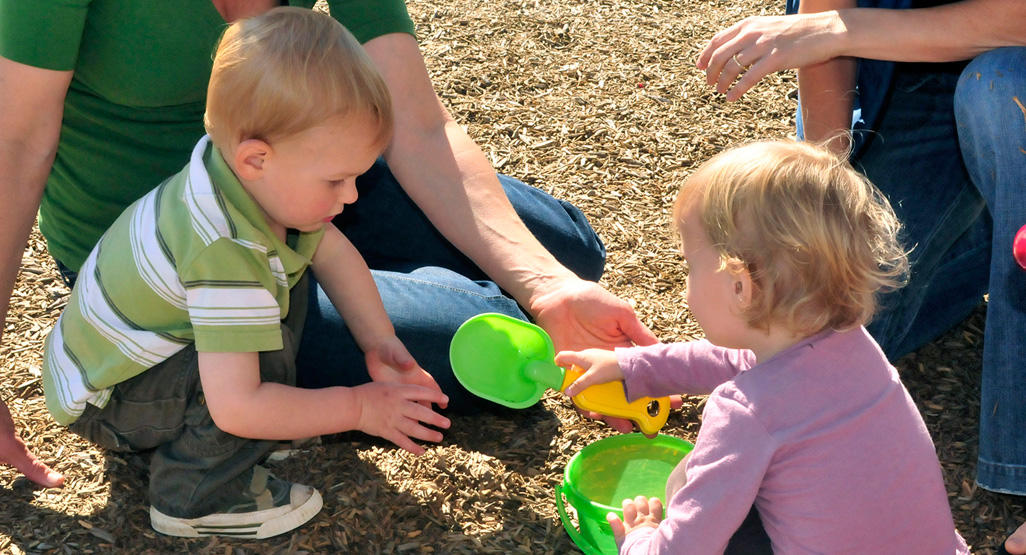What to expect at this age
"You can't have it!" your child shouts as he grabs his toy truck from his playmate. No sooner have you smoothed out that squabble than another erupts. "No!" he yells as his visitor heads toward his rock collection. Why doesn't your child know how to share?Well, he knows; he just isn't very consistent about doing it. Your three or four year old may spend hours a day playing with other children, he can take turns in games, and he's less self-centred than he was a year or two ago. But he's still impulsive and doesn't have a very good grasp of time, so waiting while his playmate takes a turn with a coveted toy is challenging for him. On the other hand, many preschoolers love to draw pictures for teachers, make presents for parents and share snacks with friends. Children are just learning that it feels good to give and that it's fun to share with friends. You can sow the seeds of sharing by encouraging these displays of generosity and by gently discouraging your child's less-charitable impulses.
What you can do to help your child to share
Make sharing funTeach your child cooperative games in which players work together toward a common goal. Do puzzles together, taking turns adding pieces, for instance. Share projects, too: water the plants, sweep the floor, or unpack the shopping with him. Finally, give him things to share with his friends now and then, like a special snack for nursery or a roll of stickers to divvy up during playtime.
Don't punish stinginess
If you tell your child that he's selfish, discipline him when he doesn't share, or force him to hand over a prized possession, you'll foster resentment, not generosity. To encourage sharing, use positive reinforcement rather than admonishment. Keep in mind, too, that it's OK for your child to hold back certain items. As he matures, he'll learn that sharing with friends – who are becoming increasingly important to him – is more fun than keeping things to himself.
Talk it up
When children squabble over toys, help them work out what's really going on. If a friend is holding something back, explain to your child how his playmate might be feeling. For instance: "Josh really likes that toy, and he doesn't want anyone to play with it right now." Help your preschooler put his own feelings into words too. When he's not being especially generous, ask him what's wrong. Maybe you'll discover that there's a shortage of train tracks at his nursery or that he especially prizes his football cards because they were a present from Grandad.
Teach your youngster to problem-solve
If your child has a death grip on a toy truck that his playmate wants, chances are he's thinking, "It's either him or me." The concept of sharing the truck may not even have occurred to him. Encourage your child to take turns with the truck (setting a kitchen timer to mark each child's turn may help), reassure him that sharing isn't the same as giving away, and point out that if he shares his toys with friends, they'll be more inclined to share theirs with him.
Set the stage
Before playtime, ask your child if there's anything he'd rather not share, and help him find a good place to keep those special toys. Then ask him to think of some things that would be fun for him and his visitor to play with together, such as toy walkie-talkies, art and craft supplies, building blocks and sports equipment. That will put him in a sharing frame of mind when his guest arrives. Ask his friend to bring along a toy or two of his own as well, since your child may be more generous if he's not the only one doing the giving.
Respect your child’s things
If your preschooler feels that his clothes, books, and toys are being manhandled, it's unlikely that he'll give them up even for a moment. So ask permission before you borrow his coloured pencils, and give him the option of saying no. Make sure that siblings, friends and babysitters respect his things too, by asking if they can use them and by taking care of them when they do.
Lead by example
The best way for your three or four year old to learn generosity is to witness it. So share your ice cream with him. Offer him your scarf to fashion into a superhero's cape, and ask if you can try on his new hat. Use the word share to describe what you're doing, and don't forget to teach him that intangibles (like feelings, ideas and stories) can be shared too. Most important, let him see you give and take, compromise and share with others.







